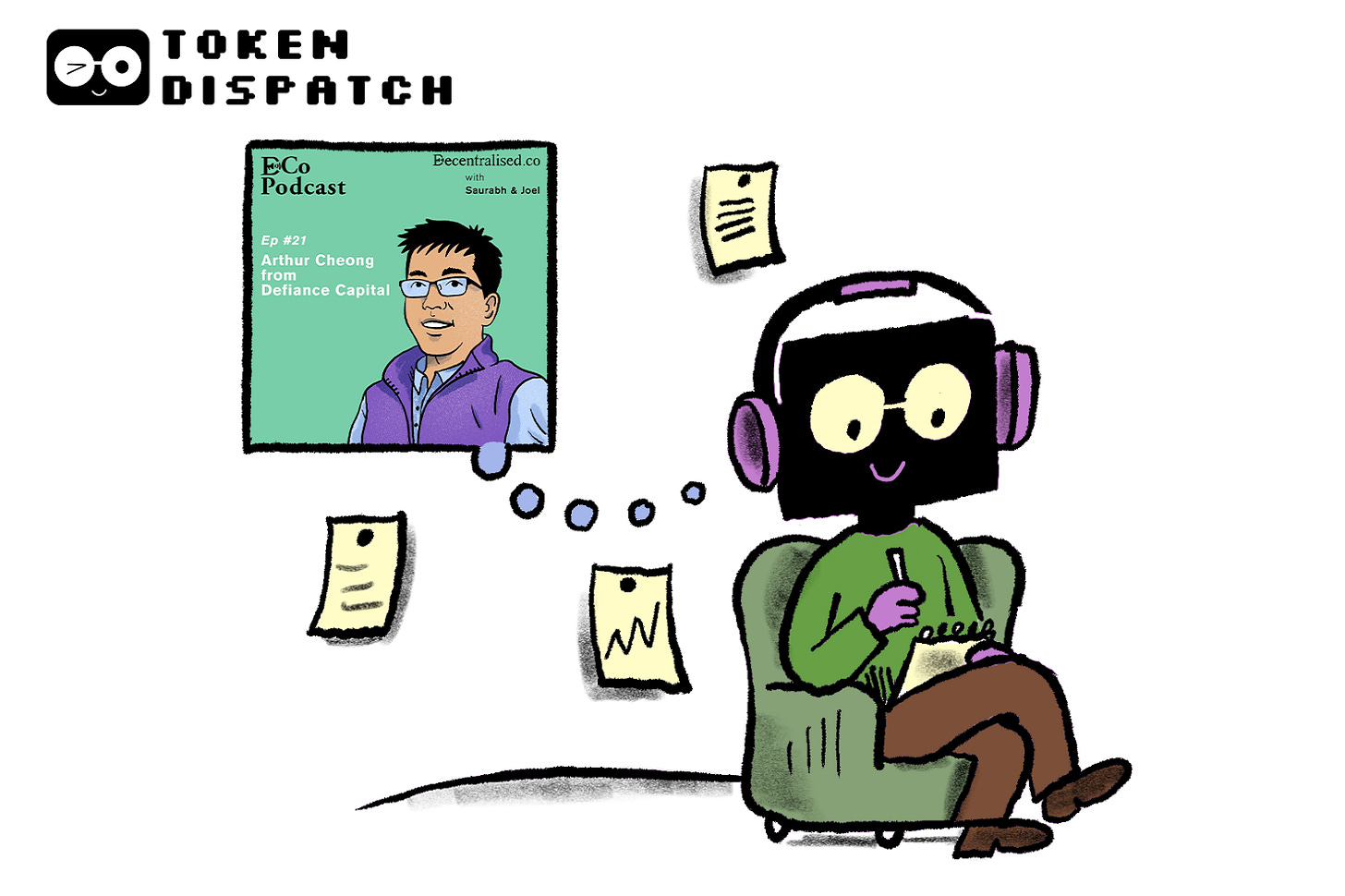The Cynical Optimist’s Ledger 🤞🏽
On belief, behaviour, and the strange places value hides
Hello
Every week, I sit down and tune into a DCo podcast hosted by Saurabh Deshpande and Joel John for our partners at Decentralised.co. As part of this ritual, I listen to builders solving problems in Web3 and then share my takeaways with our retail readers at Token Dispatch.
This week’s reflections focus on the episode featuring Arthur Cheong, CEO and CIO of DeFiance Capital.
Arthur reflected on his version of maturity as an investor in this episode. Consider watching the full episode here 👇🏾
Unlock Web3 Insights with Decentralised.co
Long-form stories trusted by the best in Web3. Senior executives from 140+ enterprises trust them to keep them updated on what’s going on in crypto.
Good writing. In-depth conversations. Right in your inbox.
Subscribe to Decentralised.co
Often, while talking to my crypto-unaware friends, I have seen them view crypto as something with a moral undertone. I understand why they do so; it began, after all, as a protest against banks, gatekeepers, and centralised controlling authorities. Crypto promised products that are better and more equitable by building on top of some of their core ethos of decentralisation, censorship resistance and transparency.
Many founders built believing decentralisation itself was the product. Censorship resistance was the feature. They were convinced that if you built systems that no one could shut down, users would adopt them automatically.
But they didn’t. At least not as many to help them build sustainable businesses on top of these ideals.
The irony is that the protocols that safeguard freedom have fewer users than the apps that play to impulse. Tornado Cash fought for privacy and got banned. Lens, Farcaster and Nostr fight for decentralised speech but live in a small echo chamber.
Meanwhile, Pump.fun, a project with no higher calling than speculation, has more daily transactions than most “pure” protocols combined. It has also set a benchmark for other crypto projects by demonstrating its revenue-generation capability and building a sustainable business through strategic token buybacks.
Read: Burn, Baby, Burn 🔥
I don’t see this happening because users hate ideals. I attribute it instead to the failure of crypto projects to reconcile capital and attention. Joel captured it well in the episode by talking about how they flow like a river — and most builders either try to dam it or swim against it. The ones who thrive, he said, are those who align their story with the direction in which the current already moves. In his words, attention and capital are correlated; if you don’t have one, the other rarely stays.
It came across to me as a simple but important observation. Ideals can raise attention without liquidity. Infrastructure can raise liquidity without attention. Only when you blend both does the market reward you by attracting good capital toward a narrative that seems believable. Memecoin launchpad, pump.fun, managed to achieve precisely this.. Tornado Cash didn’t get the chance.
We can always argue whether pump.fun helped create value or merely capture it, but there’s no denying that it built a product that a mass audience wanted to use. I’d like to believe that value creation rarely coincides with value capture in crypto. Those who capture value simply build where behaviour already exists. Just the way pump.fun did.
The Solana-based memecoin launchpad observed early that speculation is the social graph of crypto. It didn’t worry about convincing users about its ethics and governance. It just made speculating easier, faster and more dramatic.
Creation, on the other hand, is the slow act of expanding what’s possible. Uniswap created the model for permissionless trading, which the meme-token launchpads then used to capture value.
The insight ‘ease beats ideology’ is what almost every decentralisation-first builder keeps missing.
I would say it’s an evolutionary journey.
Crypto began with people coding for permanence, but has since evolved into something where many code for attention.
Arthur spoke about the importance of being a “cynical optimist” in crypto. A cynical optimist knows that utility and not ideals drive most adoption. But they also know cynicism alone can’t build new things.
It’s a complex duality to live with. I have been there, too. I used to believe decentralisation was an absolute good and a guaranteed shot at success in crypto. I looked at it more as a moral compass and not a market variable. I have travelled some distance from that school of thought. Today, I see it more as a feature that’s definitely useful to many, but not as a sacred route to success.
But why add cynicism to optimism?
Cynicism helps you recognise the limits of ideals. In crypto, it helped us identify that not every noble protocol will find an audience and not every memecoin will ‘shoot to the moon’. The history has been the evidence. You need to look no further than the bitter memories of the FTX crash and, more recently, the presidential memecoin controversies.
In a way, I see cynicism as crypto’s form of due diligence. A good idea doesn’t matter until it has both traction and liquidity. Cynicism helps you value a project not when you see users swarm to the project but when they stay even after the incentives dry out.
This is why I believe ideals such as decentralisation and censorship resistance, for all their virtue, work best when they are embedded features rather than pitch deck pointers that the founder is overly obsessed with.
Crypto’s underlying aspiration to offer the world better and more equitable products doesn’t by default make all projects good product-market fits.
Arthur said cynicism sharpens risk perception. I think it also clarifies worth. In the crypto world filled with transparent, accessible on-chain data, being a cynical optimist will make you look for the story beyond the numbers.
Off to pour another chai and watch the next “useless” app accidentally teach the world how crypto really works.
That’s it for this week’s reflections. I’ll see you next week,
Prathik
Arthur also shares his thoughts on the need for liquid capital in crypto. Consider watching it in the full episode here 👇🏾
Token Dispatch is a daily crypto newsletter handpicked and crafted with love by human bots. If you want to reach out to 200,000+ subscriber community of the Token Dispatch, you can explore the partnership opportunities with us 🙌
📩 Fill out this form to submit your details and book a meeting with us directly.
Disclaimer: This newsletter contains analysis and opinions of the author. Content is for informational purposes only, not financial advice. Trading crypto involves substantial risk - your capital is at risk. Do your own research.






